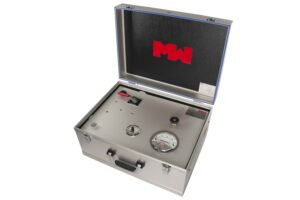PFS Product Brochure.


To find out more about our Pulverised Fuel Sampler (PFS) please feel free to download the product brochure:
The Pulverized Fuel Sampler


To find out more about our Pulverised Fuel Sampler (PFS) please feel free to download the product brochure:


The Pulverized Fuel Sampler (PFS) is a portable fuel particulate analyzer used for sampling fuel particulate flows carried within the airstream.
The samples are extracted from the full cross section of the fuel pipe in accordance with the international standard ISO 9931 and can be used to determine the fuel mass-flow in the pipe.
For optimal measurements, the PFS should be used together with a M&W Dirty Air Pitot (DAP) or Dirty Air Pitot Laser (DAPL) to ensure a fully isokinetic sample.
The Pulverised Fuel Sampler (PFS) includes a portable aluminum control box, a manual sampling lance with a rotating head with 4 sampling nozzles, a high efficiency precipitating cyclone, a sample bottle, a reinforced compressed air hose, and a power cable for the control box.
The sampling process with the PFS begins by preheating the sampling lance, after which the sampling lance is inserted into the fuel pipe through a dustless connection. Once the sampling lance is in place, the sampling sequence is initiated from the portable control box. The sampling sequence spans four minutes and is carried out according to the ISO 9931 standard.
During the sequence the operator rotates the sampling head every 15 seconds by turning the sampler head position wheel. This rotation ensures that sampling takes place in all 16 predetermined positions of the sampling plan, covering 64 sampling areas evenly distributed over the cross-section of a circular pipe. This thorough coverage is essential for accurately capturing the characteristics of the fuel particulates within the pipe. Throughout the sampling sequence the fuel particulates are automatically separated in the cyclone and collected in the sample bottle.
After the sampling sequence is completed, the sampling lance is withdrawn from the fuel pipe and the sample bottle is detached. The content of this bottle is then weighed, providing the necessary data to calculate the fuel mass flow within the pipe accurately.
During the sampling sequence, the velocity of the sample extraction gas is kept at the same level as the transport pipe’s gas velocity to achieve isokinetic sampling. The flow velocity within the pipe is determined with other equipment. For optimal results, it is advised to use the PFS in conjunction with either the M&W Dirty Air Pitot (DAP) or the Dirty Air Pitot Laser (DAPL), both of which are instruments specifically engineered for accurate flow velocity measurement within a pipe.
Options
The PFS can be delivered with a Snap Lock Dustless Connector (PFS-SL). This product has been developed by M&W in order to help customer to save time and provide an easy way to secure a connection between the fuel pipe and measuring instrument. The design enables insertion of the measuring instrument into the fuel pipe with internal over-pressure which reduces leakage of coal-dust and provides a gas tight sealing.
Nota Bene 1
M&W offers customers a facility for quantitative assessment of the performance following one or several types of analysis such as Variographic Characterisation or a Replication Experiment based on the customer’s own material.